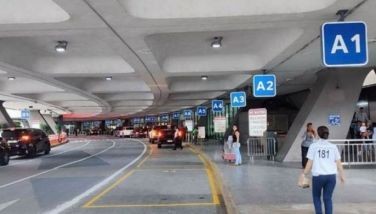Transfer of First Centennial Clark to CDC may be held up

September 30, 2002 | 12:00am
The plan of the National Development Co. (NDC) to transfer the money-draining First Centennial Clark Corp. (FCCC) to the Clark Development Corp. (CDC) may be held up, if Asian Construction Development Corp. (Asiakonstrukt), a minority shareholder in FCCC, opposes the transfer.
This possibility was confirmed by Trade and Industry Secretary Manuel Roxas II last week.
According to Roxas, Asiakonstrukt, although a minority shareholder in FCCC, actually has the veto power over corporate decisions of FCCC which constructed the Expo Filipino in Clark.
Roxas admitted that "it is a weakness in the contract allowing a minority to have a veto power."
Normally, minority shareholders are only given the right to match an offer.
Roxas further disclosed that if Asiakonstrukt "questions it, it’s another hurdle."
However, there is nothing in the law that prohibits the transfer," Roxas assured.
In fact, Roxas said, the Department of Finance and Bureau of Treasury are already studying the transfer of liabilities from the NDC to the CDC.
Roxas reiterated that the transfer would just be a "wash" for NDC as it would be transferring both the liabilities and some assets to the CDC.
The transfer of the FCCC to CDC, Roxas explained, is practical since the Expo Filipino is already in Clark and the CDC could better oversee it than the NDC.
The transfer would not really improve the financial standing of NDC, Roxas admitted, since the servicing of the debts of FCCC is being done by the National Government.
However, it would ease the financial drain on NDC which still has to allocate funds for the maintenance of the Expo Filipino facilities.
FCCC was a joint venture between NDC and Asiakonstrukt.
NDC owns 60 percent while Asiakonstrukt holds 40 percent of FCCC.
FCCC’s first project was the ambitious theme park Expo Filipino located within a 900-hectare property inside the Clark Special Economic Zone.
The Expo Filipino was suppose to be a showcase for the country’s centennial celebration in 1998.
FCCC spent at total of P2 billion for the monumental failure of which P1.5 billion came from the NDC and P600 million from Asiakonstrukt.
NDC, however, was able to secure a National Government guarantee for some P977 million in loans from the Social Security System, the Government Service Insurance System, and the Land Bank of the Philippines.
Thus, even though the Expo Filipino project failed, government had to continue servicing the debt of NDC.
This possibility was confirmed by Trade and Industry Secretary Manuel Roxas II last week.
According to Roxas, Asiakonstrukt, although a minority shareholder in FCCC, actually has the veto power over corporate decisions of FCCC which constructed the Expo Filipino in Clark.
Roxas admitted that "it is a weakness in the contract allowing a minority to have a veto power."
Normally, minority shareholders are only given the right to match an offer.
Roxas further disclosed that if Asiakonstrukt "questions it, it’s another hurdle."
However, there is nothing in the law that prohibits the transfer," Roxas assured.
In fact, Roxas said, the Department of Finance and Bureau of Treasury are already studying the transfer of liabilities from the NDC to the CDC.
Roxas reiterated that the transfer would just be a "wash" for NDC as it would be transferring both the liabilities and some assets to the CDC.
The transfer of the FCCC to CDC, Roxas explained, is practical since the Expo Filipino is already in Clark and the CDC could better oversee it than the NDC.
The transfer would not really improve the financial standing of NDC, Roxas admitted, since the servicing of the debts of FCCC is being done by the National Government.
However, it would ease the financial drain on NDC which still has to allocate funds for the maintenance of the Expo Filipino facilities.
FCCC was a joint venture between NDC and Asiakonstrukt.
NDC owns 60 percent while Asiakonstrukt holds 40 percent of FCCC.
FCCC’s first project was the ambitious theme park Expo Filipino located within a 900-hectare property inside the Clark Special Economic Zone.
The Expo Filipino was suppose to be a showcase for the country’s centennial celebration in 1998.
FCCC spent at total of P2 billion for the monumental failure of which P1.5 billion came from the NDC and P600 million from Asiakonstrukt.
NDC, however, was able to secure a National Government guarantee for some P977 million in loans from the Social Security System, the Government Service Insurance System, and the Land Bank of the Philippines.
Thus, even though the Expo Filipino project failed, government had to continue servicing the debt of NDC.
BrandSpace Articles
<
>
- Latest
- Trending
Trending
Latest
Trending
Latest
Recommended

























